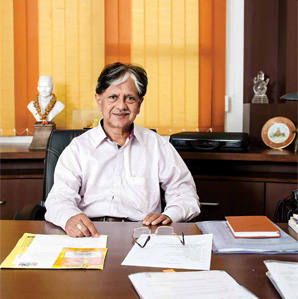
Most good management schools in India aspire to be like IIMs. But there are a few who believe in charting out a course of their own. One such is Delhi’s Lal Bahadur Shastri Institute of Management (LBSIM), consistently ranked amongst the top B-schools in India, whose credo is, ‘Only knowledge takes you beyond the obvious’, and has taken management education beyond the set parameters of entrepreneurial skill and social commitment
It is difficult to write about an institution built by a son as a tribute to the memory of his father. More so when the father was the second prime minister of India—Lal Bahadur Shastri—tallest of leaders who truly personified whatever was best in India’s culture, tradition and values.
How difficult the task was and how the son built the institute brick by brick over the last 21 years is a moving story. Not only had he to make sure it was a centre of excellence among premier B-schools in India but also to impart management education imprinted by the values that were dear to his father.
Today, if the Delhi-based Lal Bahadur Shastri Institute of Management (LBSIM) is ranked 24th in the Ministry of HRD’s list of top 50 management institutions in India, the credit mainly goes to second son of Shastriji, who like his late father, is a low-profile and unassuming Congress leader-cum-educationist who is busy quietly establishing quality educational institutions in the name and spirit of his great father in different parts of the country
He established LBSIM in August 1995 and worked hard to make it a fitting memorial to the ideals and vision of his great father. In just a few years, LBSIM emerged as one of the top business schools in the country and has improved its position ever since.
Located in the south-west district of Delhi’s Dwarka sub-city, the institute is easily accessible to all students living anywhere in the Delhi/NCR region as it’s very close to the Sector 11 station of Delhi Metro.
The institute attracts the crème de la crème of students who compete in the Common Admission Test (CAT) for its very popular, full-time PGDM (General) and PGDM (Finance) courses.
Recognised by the All India Council of Technical Education (AICTE), the institute also offers a full-time PGDM course for executives and another one for part-timers. It has another course, Masters of Computer Applications (MCA), in its kitty, affiliated to Delhi’s Guru Gobind Singh Indraprastha University.
The institute has also got membership from globally recognised accreditation agencies like the AACSB (Association to Advance Collegiate Schools of Business), and its programmes are accredited by NBA (National Board of Accreditation), IAO (International Accreditation Organization), USA, and AIU (Association of Indian Universities), to name a few. Incidentally, it also has the prestigious Bloomberg Finance Laboratory and IBM Business Analytics Laboratory which offers training and research in most advanced areas of finance and economics.
To know how challenging the two-decade long journey of LBSIM has been, Corporate Citizen spoke to both—its founder-chairman, Anil Shastri (AS) and its equally down-to-earth director, Dr Arya Kumar (AK), an economist and a product of Birla Institute of Technology & Science (BITS, Pilani, Rajasthan).
While Anil looks an exact replica of Shastriji, reflecting the same humble, soft-spoken and dignified image, Dr Arya comes forth as a true guru in the best traditions of India’s ancient wisdom and culture. Over to AS and AK:
“Along with professionalism, we have also kept Shastrian values and ethics on a very high pedestal in our teaching curriculum. We have always kept our fee structure not only low but perhaps the lowest in the country. Our focus is to provide high quality management education which is affordable and accessible to all. Going beyond rankings, what makes us different is our focus on imparting value-based education as a tribute to the vision of Shastriji who believed in simple living and high thinking”— Anil Shastri, Founder-Chairman, LBSIM

AS: Actually, way back in 1994-95, I felt we should do something constructive to perpetuate the memory of Shastriji. Though successive governments have been doing little things off and on in his name, nothing very significant was being done. So I thought maybe we can think of doing something in the area of higher education and that’s how this idea was conceptualised almost 20 years ago.
AS: In 1991, economic reforms had been initiated and Corporate India had started feeling the need for trained graduates with professional degrees in management education. With the unleashing of economic liberalisation and globalisation, there was going to be a quantum jump in job opportunities for such graduates. Moreover, I had worked 17 years at Voltas in senior positions. So I felt, why not go in for management education to produce high-quality, value-based MBAs? That’s how we conceptualised LBSIM, initially on rented premises at RK Puram, of which I’m the chairman.
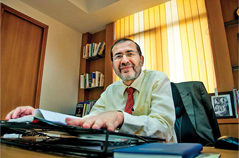
AS: As chairman, the one thing I ensured from day one was that LBSIM would be totally professionally managed, which meant I would not get involved with its day-to-day operations. As chairman of the board of governors, I, along with the board, draw out the broad policies, decide our motto, mission and vision, and then pass them on to the director for execution. That practice continues even today.
AS: Yes. But along with professionalism, we have also kept the Shastrian values and ethics on a very high pedestal in our teaching curriculum. Another thing that distinguishes us from the rest is that we have always kept our fee structure not only low but perhaps the lowest in the country amongst private business schools. Even today, for a comparable management institute near our ranking, we’re charging the lowest fee in the NCR Delhi region. Our focus is to provide high-quality management education which is affordable and accessible to all. It is this resolve to pursue excellence that the Ministry of HRD in its latest report, released on April 4, has placed us at number 24 among the top 50 institutes in the country. In fact, after IIMs and government universities, we are number eight. But going beyond rankings, what makes us different is our focus on imparting value-based education as a tribute to the vision of Shastriji who always believed in simple living and high thinking.
AK: We also give a distinct thrust to create an eco-system for the promotion of entrepreneurship on the campus. Around 10 percent of our alumni are entrepreneurs whom we involve actively in entrepreneurship development programmes. We try to inculcate an attitude of ‘can do’ and spirit of entrepreneurial leadership in students. We offer specific courses such as Entrepreneurship and Small Business Management, Digital Marketing, e-Commerce and Business Analytics which encourage students to go for ventures of their own. We’ve established an LBS Entrepreneurial and Incubation Centre to create an ecosystem on campus to encourage students to take up entrepreneurship as a career option. Some of the key activities include inviting entrepreneurs to share their experiences to inspire and motivate the students, organising workshops on entrepreneurship themes, providing mentoring support to startups, connecting startup teams with angel investors, venture capitalists and seed funding sources, business plan competitions, startup connect events and undertaking research in the area of entrepreneurship.
“We did face some problems like getting the completion certificate, occupation certificate and such other government clearances. But since we truly believe in the Shastrian values of perseverance and patience, we waited and waited, without succumbing to any kind of pressure to give bribes to get the work done. Finally all clearances came to us, though a bit late, but they did come at last” — Anil Shastri
AS: The institute took an initial loan of around Rs 28.60 lakh, which was fully repaid in 2003. That was all. Since then, it is all self-generated and nothing is siphoned out of the institute. Whatever has been earned is ploughed back into the institute for the common good of the students. It has never been treated as a commercial activity or a business venture. It runs on no profit, no loss basis and we’ve maintained that all along our journey. That’s why I said, ethics and values matter a lot to us. No trustee or board member draws anything from the institute. We only pay them some honorarium when they visit us for some meetings.
AS: Yes. When we shifted to our own building in Dwarka, we did face some problems like getting the completion certificate, occupation certificate and such other government clearances as there is blatant corruption all over, from the top to the bottom. It was a little difficult for us to handle. But since we truly believe in the Shastrian values of perseverance and patience, we waited and waited without succumbing to any kind of pressure to give bribes to get the work done. Finally all clearances came to us, though a bit late, but they did come at last.
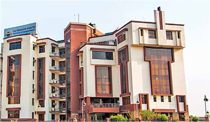
AS: I think it’s because we never compromised on the quality of education. No non-PhD is taken into our faculty. Our teaching methodology and infrastructure stand out. It includes a video-conferencing room, a huge library having the best of books and journals on management, state-of-the-art computer labs and the Bloomberg Lab—which ensure very high academic standards. That’s why top companies visit our campus every year. By the grace of God, we’ve maintained a 100 percent placement record all these years. AK: Our ranking has gone up from 32 to 28 to 24 to 19 in just last two years as per different rankings. As per the latest rankings announced by the HRD Ministry, we are 24th all-India and eighth among all private B-schools. We’re now in direct competition with giants like MDIGurgaon, IMT-Ghaziabad, Delhi’s FORE School of Management and International Management Institute which is headed by Prof. Bakul Dholakia of IIM Ahmedabad-fame. People have started giving me feedback that academic rigour has improved significantly in the campus and that gives me a lot of satisfaction because besides giving a sharp focus on the Shastrian values that we consciously inculcate amongst our students, we’re also very professional in our approach to admissions, faculty selection and placement processes. In fact, we are also going for very active collaboration with the industry through our Industry Immersion programme. We also have an LBS Corporate Relations Cell which works hard to develop a long-lasting relationship with the industry and corporate bodies.
“At LBSIM, we try to develop a ‘can do’ attitude among our students and inculcate the spirit of entrepreneurial leadership. My message to such an aspirant is to grab such an opportunity simply to enhance his/her competencies. I can assure him that we’ll do everything to develop his personality with strong values to help him respond effectively to future corporate challenges” — Prof (Dr) Arya Kumar
AK: Oh yes. These are basic Shastrian values namely; self-discipline, honesty and integrity, fairness and firmness, collaborative spirit and commitment that favours a passion for excellence by encouraging an attitude for lokasangraha or working for the good and welfare of all - to name a few. After all, we’re preparing future managers and business leaders for the country. And, what could be better than doing so through the perennial wisdom emanating from Indian scriptures, Vedantic knowledge, yogic psychology as well as Puranic literature and epics, especially the Bhagwad Gita.

AK: I’m trying to create a distinct niche for LBSIM in many respects. Since LBSIM is granted full professional autonomy, we have introduced a specialisation in e-Commerce and added new courses in Business Analytics, Digital Marketing and Small Business Management for PGDM students in the last one year. On the examination reform front, I’ve made sure that students are shown all their marks within seven days of the evaluation of their answer sheets and if there is any discrepancy, they can resolve it then and there. But that is not all. Previously, if one course was being taught by three faculty members, they would not talk to each other and set their question papers independently. But now, in one year, I’ve made sure that there is a lot of collaboration happening among the faculty. Similarly, earlier, nobody used to bother when a guest faculty from outside was invited, but now our faculty gets involved so that they get trained and become competent either to take that course independently or contribute jointly in the very next session. So we are on a journey to keep introducing innovations in teaching-learning process for strengthening academic rigor to provide distinct experience to students in management education.
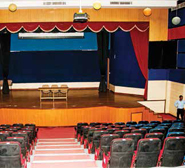
AK: Getting accreditation from the Association of MBAs (popularly known as AMBA, UK) is a bit easy but we’ve chosen to take it from AACSB, which is pretty difficult because it is ranked as one of the top-most accreditation agencies for management schools. We already are a member of AACSB and therefore have taken a call to go for its accreditation. Until last year, only three B-schools in India including IIM Calcutta, TAPMI Manipal and ISB Hyderabad had got it. IMT Ghaziabad is the fourth one which got it in April this year.
AK: It’s very important for us. We are in the process and confident to get it. Otherwise we’ll not be able to grow and create our own niche. We may be able to survive but the pace at which things are happening in the field of management education, at least 25 percent - 30 percent institutions out of about 4,000 will close down in the very near future. The situation is very bad. As it is, we’ve reached a point where seats are not getting filled in a majority of institutions, engineering as well as management. That’s a very clear reflection that we have grown in numbers without making education purposive.
AK: Right now, I’ve two major priorities. One is to get international linkage, purposive—not ornamental. I want linkages that work, that deliver. My second priority relates to our hostel. My longterm plan is to have an independent hostel within a distance of 3 to 5 km.
AK: At LBSIM, we try to develop a ‘can do’ attitude among our students and inculcate the spirit of entrepreneurial leadership. Attitude matters a lot. So my message to such an aspirant is to grab such an opportunity simply to enhance his/her competencies. I can assure him that we’ll do everything to develop his personality with strong values to help him respond effectively to future corporate challenges. After all, you need a winning edge in life, and in order to get it, you need to strive for excellence, which is what LBSIM is known for.

AK: I did my post-graduation in 1977 and PhD in 1982 from BITS, Pilani. I started my teaching career in 1978 at my alma mater. But in 1983, I joined as an economist in the Strategy department of Canara Bank and thereafter spent two decades in India’s banking industry in different capacities. I took over as Chief General Manager and Zonal Head for the Delhi office of the Industrial Investment Bank of India in 2001 and contributed in project financing, reconstruction of sick units, and overall business development of the Zone. In 2003, I re-joined BITS, Pilani and steered entrepreneurship development on campus, including looking after the Technology Business Incubator as also served as Dean, Students Welfare Division and Faculty In-charge for Alumni Affairs. Subsequently I got an opportunity to lead the Lal Bahadur Shastri Institute of Management (LBSIM) as Director in November 2014, where I’m trying to take this institution to the next level of growth, in tune with the fast-changing needs of our times.
AK: My soulmate has been serving as Associate Professor in the Physics department at BITS, Pilani. Along with her professional responsibilities, she also takes care of home management, particularly caring for our old parents. My son, after doing his post-graduation in physics, did his MBA from BITS, Pilani and has been serving leading corporates for over five years. He is currently with the Times of India Group. My family has been a source of great strength to me in pursuing deeper interests and in doing what I like the most.
AK: I had my father as my role model. He inspired me to go for PhD in 1982 in the area of Financial Management of Higher Education with an intensive study of BITS, Pilani. He had served in the Indian Army for 16 years and then joined BITS, Pilani in an administrative capacity and worked there for more than 33 years with all its institution builders. Today, at the age of 93, he still keeps himself busy working as Editor for the English version of Akhand Jyoti for the last six years. This magazine has a huge circulation among more than 2 crore followers of Shantikunj, a spiritual organisation of the All World Gayatri Parivaar, headed by Dr Pranav Pandya, who was recently in the news as he refused to accept the Rajya Sabha seat offered to him.
AS: I think it is not fair. They can’t have two sets of guidelines, one for IIMs and the other for nonIIMs. Maybe what they can do is to give the same power to award MBA degrees to the top 50 institutions that they can decide, irrespective of whether they are IIMs or non-IIMs.
“Whatever has been earned is ploughed back into the institute for the common good of the students. It has never been treated as a commercial activity or a business venture. It runs on a no profit, no loss basis and we’ve maintained that all along our journey” — Anil Shastri
AS: A good management institute must have regular, full-time faculty. Yes, it is difficult to get good faculty but they must try to meet AICTE guidelines. If we can have the requisite number of faculty, why can’t others have them? However, management education also requires a good blend of teaching by corporate executives having passion for teaching.
AS: It is very good if you go to a top-quality B-school. However, if you go to some B- or C-grade management college, then it may not be so good. So, you have to take an informed decision about it.
AS: There are lots of changes happening in the curriculum because of the demands from the corporate world. Since management institutes cater to the requirements of the industry and corporate houses, they have to oblige them and introduce new electives as per the demands of the industry. So, if they want so and so course to be dropped and something else introduced, you’ve got to do that. Gone are the days when you had everything very simple—finance, marketing and HR—and that’s all. Today there are lots of other electives like Treasury Management, Investment Management, Risk Management, Retail Management, Infrastructure Management and Strategic Accounting & Control, to name just a few. Another trend that we find is that now engineers do not want to go into the field of their specialisation. For instance, a civil engineer doesn’t want to go out into the field and work at the construction site. He prefers doing an MBA because that will fetch him a cool, air-conditioned job in an IT company—TCS, Infosys, Wipro, HCL or the rest—with a solid pay-package. The same is the case with mechanical and electrical engineers. I’m saying this because most of the students from management schools are picked up by these IT and consulting companies.
AS: We have a limitation of land size, providing a hostel is turning out to be a big challenge. We’re trying to get something on rent but ultimately we’ll build our own hostel.
AS: Alma maters have always played a very significant role in a person’s life. In my case, I studied in Delhi’s St. Columba’s School and St. Stephen’s College which have contributed immensely to what I’m today. They laid the foundation and helped me in becoming more articulate. Similarly, as a student of economics at St Stephen’s College, I developed my analytical abilities which helped me a lot in my 17-year-long corporate journey. By the way, I also did an Advanced Management Programme at Ashridge Business School of the UK.
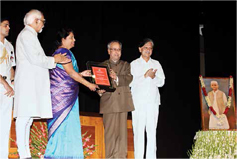
AS: Yes. Encouraged by the good response we received here in Delhi, we set up an institute in 1996, in Bareilly. Three years ago, we set up another institute in Indore too, and a polytechnic in a village called Manda, 63 km from Allahabad. We are also planning to do something in Hyderabad. In Indore, it is an ITI and PGDM. In Barelliy, we offer MBA and an undergraduate B.Com and BBA course too. All these institutions are named after my father.
AS: That has been a learning experience. During my 17 years at Voltas, I saw so many things—marketing, sales, HR, corporate affairs. I faced a lot of difficulties and challenges. I also faced strikes because of its highly unionised staff. So, whenever I get stuck, I apply my learning of those good old days.
AS: Corporate culture has changed a lot. Loyalties have come down. Company loyalty was very high in those days. People used to complete 25 years and get awards in Voltas. Now, we can’t think of anybody completing 25 years in a company. In Coca-Cola, they are giving gifts after five years because five years is also a big thing. But let’s be realistic and frank. If I stuck around Voltas for 17 years, it was because there were not many opportunities around. There were very few companies like the Tatas—Voltas was a Tata company, you had Bajaj, the Birlas, Dalmias, Hindustan Levers and some MNCs like ITC, Godfrey Philips and a few others. That’s all. There were no Ambanis and no Coca-Cola and Pepsi. So, the choice was very limited. Today, globalisation has resulted in the creation of lots of jobs in India. Today’s generation gets very many opportunities to create lots of wealth. In fact, if today you see India’s 30 crore middle class prospering in a big way; it is all because of the wealth that has been created in the country in the last 25 years. You go to Pakistan or Bangladesh, it is different. I went to Pakistan last November and was taken aback because there are either rich people or the very poor. There is no middle class. You don’t find shopping malls and markets bursting with people as you find them here in India. Things are pretty bad even in some western countries. India is today among the fastest-growing economies in the world and that is not a small thing.
AS: Actually, I was never keen to be in politics. But being from a political family, perhaps politics was there in my blood and when I got an opportunity way back in 1989, I availed it, though a bit reluctantly. I contested the Lok Sabha polls from Varanasi and won the elections by a huge margin. For a while, I also worked as a Minister in the Ministry of Finance, Government of India. I’ve been in the Congress Party right from the beginning and presently I’m in the Congress Working Committee. I’m also the Chairman of the Hindi Department of the party. Other than this, I’m also associated with some trusts and societies which look after various socio-economic and cultural activities. Some are in the name of Shastriji. There is a Hindustani Chetna Manch also of which I’m the chairman. We do programmes to create awareness about socio-economic issues.

AS: I naturally feel proud to be his son. I feel touched when I see people remembering him so fondly even today. Generally politicians don’t command much respect today but he remains an exception. His slogan ‘Jai Jawan, Jai Kisan’ is still very popular and touches many a heart even today. When I go to malls, airports, railway stations or such other places, I find young couples coming up to me for a photograph or wanting to speak to me—that only goes to show that the younger generation also remembers him because they perhaps find him to be different from other politicians today. All this naturally makes me feel proud being the son of such a great man.
AS: Yes... I do notice it and feel happy about it
AS: I was pretty young, around 16 and my father was 61 at the time of his death on January 11, 1966. I was not with him when he died in Tashkent, hours after he had inked an agreement with Pakistan’s President Ayub Khan to formally end the second war between the two nations which India had won decisively under his dynamic leadership. But then how did he die all of a sudden is something that raises questions. There clearly was gross negligence. Many people including eminent journalist Kuldip Nayar (who had gone with him to Tashkent) say that his face had gone blue, that there was no call bell or a telephone in his room. His place of stay was also 20 km away from the city and by the time the Russian doctors came, it was all over. So, questions arise as to why there was no medical-aid facility for him? Why was there no oxygen cylinder for him? Normally, it is kept ready whenever a prime minister travels and he was going to be there in Tashkent for seven days! Even his red diary in which he used to write everything including his daily chores was missing. Similarly, his thermos which he used to keep with him all the time was not there. So, there were too many things missing. Though they claimed he died of cardiac arrest, my mother had great doubts and she always suspected foul play.
AS: This issue has been in discussion for a long time. A couple of years ago, there was a demand raised through an RTI by one Mr Anuj Dhar to the then prime minister, Dr Manmohan Singh, but his reply was that because of security reasons, it was not advisable to declassify the files relating to Shastriji as it may affect our relations with a friendly country. But I strongly feel that now the time has come, and the Narendra Modi government should declassify files related to Shastriji’s death. He has done it in the case of Netaji Subhash Chandra Bose. Now, he must set up an inquiry to bring out the truth. I’ve requested him to do so in national interest. Though it is very difficult to say whether anything would come out of such an inquiry because most of the eyewitnesses have either died or got eliminated; nevertheless, the files must be declassified as is being done in the case of Netaji. At least the negligence part will come out more clearly, if he orders an inquiry into this matter.
AS: In terms of management education, I can tell you that even though Shastriji had no formal education in management, he practised all the modern concepts of management, albeit unknowingly. That’s perhaps why he was so successful in all his initiatives. If you study the biographies of great leaders, you’ll realise that they became great because they followed the basic concepts of management which are taught today. So, if you want India of Shastriji’s dreams, you must know that Shastriji used to emphasise on providing job-oriented education to our youth so that they are able to stand on their feet quickly. Similarly, he would not have liked to see all these hundreds of mushrooming management shops minting money. He would have got them closed and encouraged only those that believe in imparting value-based management education.
AS: That’s his choice. How can I stop him? He is a mature young man in his early 40s who has a mind of his own. He is an Aam Aadmi Party leader and a social entrepreneur involved in the promotion of education and other social causes. It was his sole wish to work for the AAP and there was nothing that I could do to stop him from doing so.
AS: He’s very controversial. But on some issues, even Rahul Gandhi and Jairam Ramesh have praised him because sometimes he does things which are out of the box. The way he raised the issue of Modiji’s degrees was quite remarkable.
AS: Like my father, I also believe in simple living and high thinking. Shastriji wanted no discrimination among Indians and true equality for all. I also feel the same way.
AS: I would first like to be known as Shastriji’s son, then as a congressman and finally as a proud citizen of this country who believes in secularism in the truest sense of the word. For instance, I don’t believe in a secularism which encourages me to hold a Roza Iftaar party just to please my Muslim friends and to thereby ask for their votes. I don’t believe in that kind of secularism.
By Pradeep Mathur